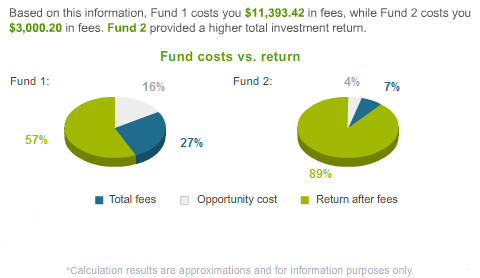Management Expense Ratios (MER) Do Matter
Post on: 22 Июнь, 2015 No Comment

As with any business, running a mutual fund involves costs. Most of those costs are expressed in the Management Expense Ratio (MER). As the mutual fund industry matures in Canada, there are more and more investors and experts supporting the need to understand mutual fund fees and their impact on returns.
Today, the debate continues. Advocates of low fee mutual funds suggest that investors should first minimize fees, which means low MERs. They further believe investors should stick to no-load funds or buy load funds without the load through a discount broker.
Financial Advisors would argue that with advice comes fees and that sometimes low MER funds do not always provide the best returns. They would support the comment by Levi Folk, managing editor of the Fundlibrary, the relentless pursuit of the lowest-cost equity mutual funds is not a guaranteed strategy for success. Some low-fee funds have below-average returns over the past five years and some higher-fee funds have done considerably better than the average.
Research background
We set out to do some research in this area. The first thing we did was looked only at mutual fund with a 10-year return. We wanted to determine if fees mattered in the short term and in the long term. We wanted to study rates of return over 1 year, 5 year and 10-year periods to see how fees impacted the different time frames. We also looked at four different categories of funds: Bond Funds, Balanced Funds, Canadian Equity Funds and Global Equity Funds.
Our findings were fascinating and summarized below:
- Over 1-year time frames, fees do not matter. There is randomness and unpredictability in the investment industry that occurs over short time periods. There is very little correlation between fees and performance in the short term. For example, in the Canadian Equity Category, one year returns for the funds we looked at ranged from a low of 0.3% to a high of 29.3%. The 9 out of 10 funds with the highest 1 year return had above average MERs. Over 75% of funds with the highest MER delivered above average 1 year returns.
- Fees matter more over longer time frames. When you look at 5 and 10 year returns, there is a greater correlation that funds with lower MERs have on average better performance. For example, if we look at the 25 funds with the lowest MERs and compare them to the 25 funds with the highest MERs, the returns on a 5 year basis were on average 50% higher. Over a 10-year period, funds with low MERs performed 25% better than funds with high MERs.
- Low MER funds do not guarantee better returns. When we look at low MER funds, 20% of low MER funds still had below average performance over 10 year periods. One third of low MER funds over 5 year periods performed below average.
- High MER funds do not mean worse returns. On the flip side, if we look at the highest MER funds, 30% performed above average on a 10 year basis and 40% were above average on a 5 year basis.
- Fees matter more with fixed income funds than equity funds. Generally speaking MERs matter less with riskier asset classes because there is a higher dispersion of returns from equities than bonds. When looking for a bond fund, fees do make a difference.
The bottom line
When choosing mutual funds, fees do matter but more over the long term than the short term. If you are the type that trades mutual funds regularly, fees should matter a lot less. At the end of the day, value equals benefit less cost. Look for funds that provide good value which means you will need to look at more than just fees. Proper analysis of mutual funds requires a multidimensional approach where you look at many different criteria and not just fees or performance.














